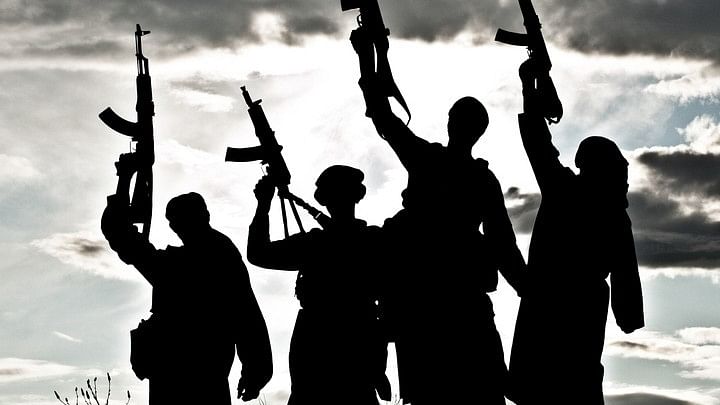
Representative image of terrorists.
Credit: iStock Photo
Srinagar: Encounters with terrorists in Jammu and Kashmir have led to the seizure of highly encrypted Chinese telecom gear "Ultra Set", an equipment used by the Pakistani army that has ended up in the hands of terror groups, officials said.
This has also raised concerns over undetected infiltrations from across the Line of Control and terrorists potentially residing in the outskirts of cities and villages, they said.
The seizure of the mobile handsets used by foreign terrorists, primarily from Pakistan and its occupied Kashmir, indicate that terror groups are receiving training, weapons and ammunition from state actors in Pakistan, said the officials aware of the matter.
These specialised handsets, exclusively customised by Chinese companies for the Pakistan army, were seized after a gunfight in the intervening night of July 17-18 last year in the Sindarah top area of Surankote in Jammu region's Poonch district and in April 26 this year after an encounter at the Check Mohalla Nowpora area of Sopore in north Kashmir's Baramulla district.
While four foreign terrorists were killed in the Surankote encounter, two were gunned down in Sopore.
The "Ultra Set" handsets, which have also been found in the south of the Pir Panjal region, combine cell-phone capabilities with specialised radio equipment that does not rely on traditional mobile technologies like Global System for Mobile (GSM) or Code-Division Multiple Access (CDMA).
The device operates on radio waves for message transmission and reception, with each "Ultra Set" linked to a control station located across the border, the officials said and added that the two "Ultra Sets" cannot reach out to each other.
They said Chinese satellites are used to carry these messages that are compressed to bytes from the handset to the master server in Pakistan for its onward transmission.
This is yet another help being extended by China to its key ally Pakistan, the officials said.
Beijing has been actively enhancing the defence capabilities of the Pakistani army along the LoC for quite sometime now.
This support includes the construction of steelhead bunkers, provisioning of unmanned aerial and combat aerial vehicles, installation of encrypted communication towers and laying of underground fibre cables.
In addition, Chinese radar systems such as those of the "JY" and "HGR" series have been deployed to improve target detection capabilities, while advanced weaponry like the SH-15 truck-mounted howitzer has been observed at various locations along the LoC.
These efforts are perceived as reinforcing China's strategic interests in Pakistan-occupied Kashmir (PoK), particularly in connection with the China-Pakistan Economic Corridor (CPEC).
Though the presence of senior People's Liberation Army (PLA) officials at forward posts was not detected, intercepted communications suggest that Chinese troops and engineers have been involved in infrastructure development along the LoC, including the construction of underground bunkers and tunnels in PoK's Leepa Valley.
These actions are believed to support the establishment of a direct route between the Gwadar Port in Pakistan and the Xinjiang province in China through the Karakoram Highway, a region under Chinese occupation.